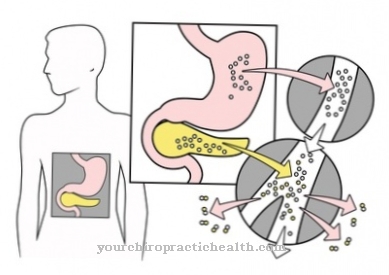The logic corresponds to logical inference based on reason. This cognitive ability is located in the left hemisphere and the frontal brain regions. Lesions in these regions result in alienation or disintegration of logic.
What is the logic?

Logic is one of the cognitive abilities of humans and corresponds to logical conclusions based on reason. Logical thinking is a specifically human ability. No other kind thinks in this way.
Traditionally, philosophy is primarily concerned with human logic and sometimes recognizes this type of thinking as erroneous because it loses its validity outside of the human type. Medicine localizes human logic to the left hemisphere, where language, arithmetic, rules, laws and general reason are located.
The frontal regions of the brain are particularly decisive for the logic of the brain. Neuroscience has now recognized the frontal lobe as the seat of cognitive and specifically human abilities. The neural interconnections of the frontal brain regions shape the personal logic of the individual. The specific interconnection patterns can change through learning experiences and drastic experiences.
Function & task
Philosophy knows different approaches to logic. For example, the statement that every statement has one of two truth values and can be designated as either true or false is known as classical logic. In addition to this bivalence principle, classical logic postulates that the truth value of compound statements is uniquely determined by that of their partial statements and by their combination. In addition to the bivalence and extensionality principle of classical logic, philosophy deals with the determination of criteria for the validity of individual conclusions and the logical value of statements.
Logic is particularly relevant in medicine in the neurosciences. The ability to think logically is what defines humans and is a task of the left brain hemisphere. In discussions it often turns out that two people can follow completely different principles of logic. The general disposition to logical reasoning is given genetically to every human being. The actual expression of the individual logic, however, only takes shape in the course of life and can be significantly influenced by personal experience.
The neurosciences interpret this influence as changes in the neural circuits, as they are relevant for learning experiences and drastic experiences of the individual.
The brain consists of a network of individual neurons, between which there is connectivity. Synaptic connections are fundamentally variable and thus follow the principle of neural plasticity.
The neurosciences trace the logic back to the area of the frontal lobe. According to modern medicine, this region of the brain contains all of the abilities that make people human. In addition to consciousness and social behavior, logic is also located in the synapse connections of this brain region. Logic thus corresponds in a multivalued sense to a certain kind of thinking. Thinking, in turn, is a specific network of connection patterns between individual neurons in the human brain.
You can find your medication here
➔ Medicines against memory disorders and forgetfulnessIllnesses & ailments
Lesions in the frontal regions of the brain can permanently change or disintegrate the logical thinking ability of an individual.Usually, frontal brain lesions are also accompanied by changes in character. Only rarely do they only affect cognitive abilities. Lesions in the frontal lobe can be attributed to traumatic brain injuries, strokes, tumor diseases, inflammatory processes, viral infections or degenerative diseases.
The frontal brain region does not necessarily have to be directly affected. Lesions in the individual projection paths between the frontal lobe and other brain regions are often sufficient. Changes in these regions of the brain are also seen in people with schizophrenia or alcohol addiction, for example.
In some cases, the lesions have a pseudo-psychiatric or pseudo-sociopathic effect. Sometimes there are also pseudo-depressive traits. Since cognitive abilities like logic make up a large part of the character, relatives often describe character changes in people with frontal brain lesions. The loss of logic can result in strange actions and alienate the person's mindset to such an extent that their opinions, beliefs and knowledge of the world are no longer comprehensible to others.
In the frontal brain region, for example, statements or actions are planned. In the case of a lesion in this brain region, any actions of the person concerned are sometimes no longer based on any logical potential. The person concerned no longer recognizes the lack of logic in his actions and statements and considers them to be entirely logical.
An example of the disintegration of logic, the disintegration of cognition and ultimately the complete ego disintegration are the degenerative changes in the frontal lobe that can be caused by diseases such as Alzheimer's. In the case of tumor diseases, viral infections or inflammatory lesions and cerebral haemorrhage, the logic and the actual character of the person affected can often be restored at least in part through adequate therapy.












.jpg)



.jpg)










.jpg)
